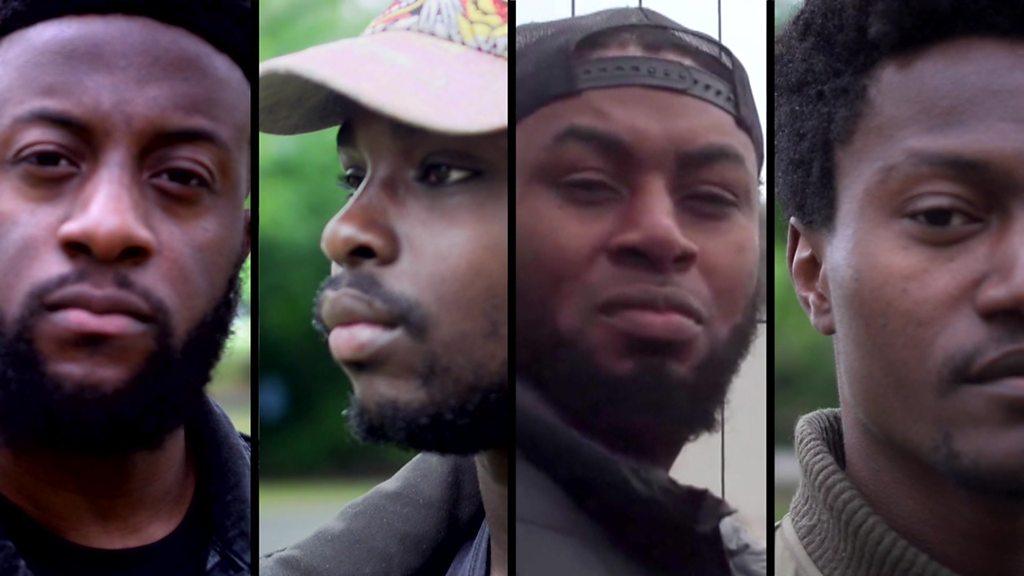Black History Month: Expert demands justice inquiry in Wales
- Published
Aaron Rees says he has been stopped and searched by police a number of times after finishing work late
A leading academic has asked Welsh law makers to hold an inquiry into black and ethnic minority (BAME) individuals in the criminal justice system.
Dr Robert Jones has warned a disproportionate number of BAME communities continue to be criminalised.
The expert said he has uncovered "a wide range of problems that require urgent attention".
The Senedd's equalities committee will consider his letter next week.
The field of criminal justice is not a devolved issue in Wales, which Dr Jones said was one of the reasons the issue has yet to receive detailed scrutiny.
13 stop and searches per 1,000 BAME people in Wales in 2018-19, compared with five for white people
91 black people from Wales in prison, compared with 14 white, 28 Asian, and 41 mixed, per 10,000 of the population
Average custodial sentences in months: Mixed race - 35; Asian - 33.8; Black - 30.4; White - 19.5
129 black people under probation supervision in 2019, compared with 46 white, 48 Asian, and 80 from a mixed ethnic group, per 10,000 population

"As it currently stands, there is no clear or authoritative understanding of how different communities across Wales experience and interact with the criminal justice system," said Dr Jones, who has been carrying out research at Cardiff University's Wales Governance Centre, in its School of Law and Politics.
"It is also unknown what steps could and should be taken by the Welsh Government to promote fairness and tackle discrimination within the Welsh criminal justice system."
He added that his findings, as part of the Justice and Jurisdiction project, "underscore just how important an inquiry into racial disproportionality within the criminal justice in Wales is at this time".
Rocio Cifuentes, from the Ethnic Minorities and Youth Support Team Wales (EYST), said she believed the Welsh Government can and should be doing more.
"There's an absolute danger that we will absolve ourselves of responsibility," said the body's chief executive.
"In Wales we can and should invest much more heavily in youth support services, in young people's education, in mentoring support schemes.
"If this pandemic has shown us anything, it's that we can and should try to tackle longstanding and entrenched inequalities in a much more robust and urgent way."

'Not fair'
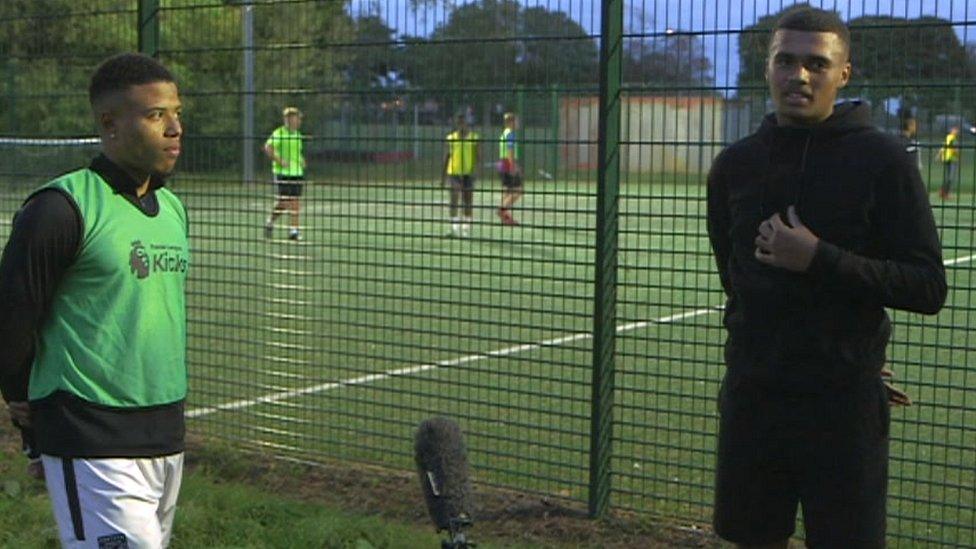
Aaron Rees and Tyrone Cristo say they feel they have been stopped due to their colour
Aaron Rees says he has been stopped three or four times by the police, often when finishing a late shift from work.
"The first time I was stopped I was 16, in London, but now I'm used to it," said the 20-year-old.
"That's just life. There's no point in me getting angry over the situation [when white friends aren't stopped] - you've just got to ignore it and be the better man."
Tyrone Cristo, 19, said: "I've been stopped quite a few times as well, and I personally think it's because of my colour.
"I'm more used to it now, but I'm still not happy about that."
He said while some use social media to respond negatively to high rates of stop and search, he takes a different stance.
"It influences me to be a good person, because I don't want that to happen to me."
'Disparity appears higher'
Both young men have been taking part in a project run by Cardiff City FC Foundation, where free football sessions are provided in a bid to steer young people away from criminal and anti-social behaviour.
Ali Abdi, from Race Council Cymru, spoke to them and others as part of Black History Month events.
"We need to start to make things fairer for our young people. The data shows they're unfairly treated and the racial disparity appears to be higher - we can't let this continue, we need to do something about this now," said Mr Abdi.
"There are young people we engage with who might get into trouble with their friend.
"But because they're black they might get a harsher sentence, or are treated differently. That can't be fair. It has a long-term impact on the young person and their relationship with the criminal justice system and the police."

Responding, a Welsh Government spokesperson said: "Keeping young black or ethnic minority people from entering the criminal justice system is a clear priority, and we are working hard in our devolved areas of influence within crime and justice.
"Our Race Equality Action Plan will be guided by the experience of Bame communities in Wales, and we are developing a new educational curriculum which emphasises BAME culture and identity.
"We are funding a number of projects to promote positive engagement for young people at risk of offending, including the Youth Justice Blueprint, and Children and Communities Grant, which are helping to address the needs of some of the most vulnerable children in our communities."
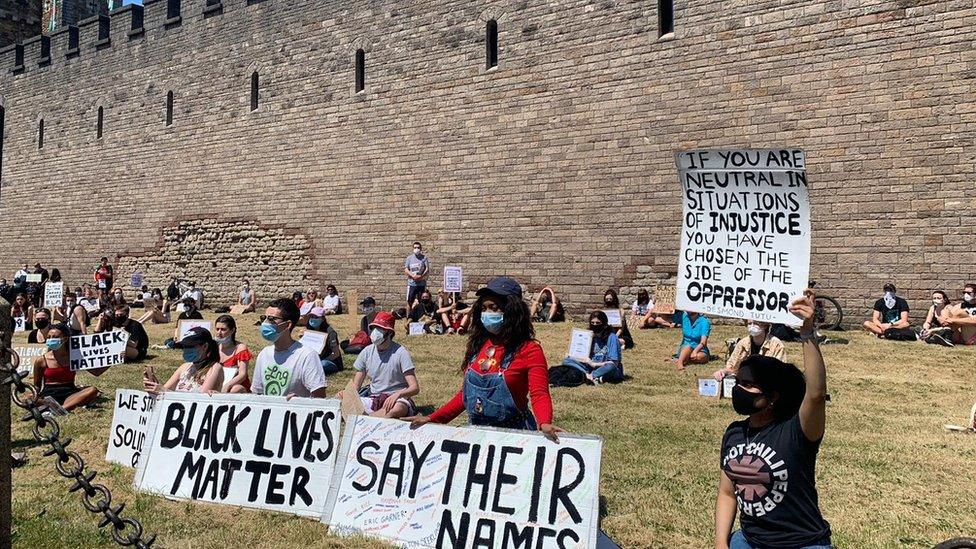
The Black Lives Matter campaigns have highlighted concerns over the justice system
The findings of Cardiff University mirror the comprehensive Lammy Review published in 2017, which highlighted the disproportionate number of BAME individuals in the criminal justice system across both Wales and England.
Earlier this year, the UK government published a progress report on the review, external, which made it clear that systemic disproportionality will take time to change.
It also acknowledged that work was needed to understand why these disparities are far more widespread than just criminal justice alone.
On the policing front, forces in Wales have various initiatives to improve trust in BAME communities.
In some, special advisory panels invite in members from a wide range of communities to scrutinise their work - suggesting improvement when necessary.
- Published28 July 2020
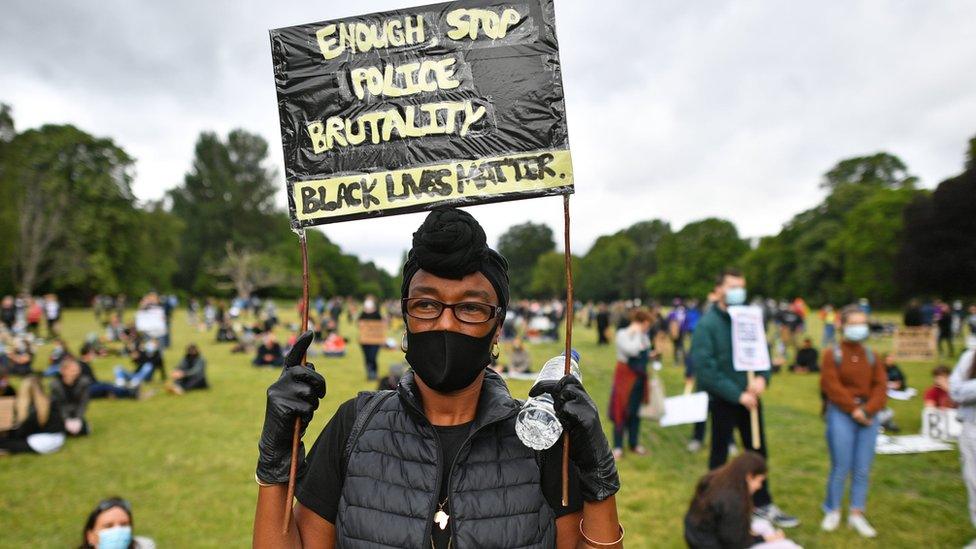
- Published25 June 2020
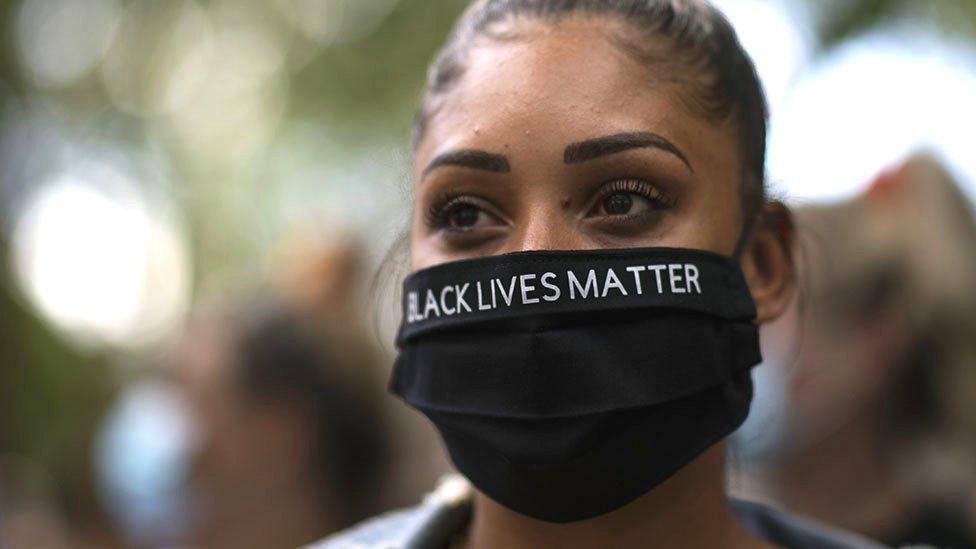
- Published12 June 2020
